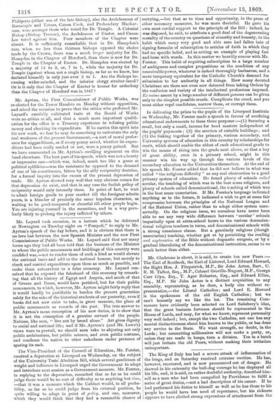Mr. Ayrton, the First Commissioner of Public Works, was re-elected
for the Tower Hamlets on Monday without opposition, and seized the occasion to prove that the critics who preferred Mr. Layard's carefully cultivated taste at the Board of Works were no critics at all, and that a much more important qualifi- cation for the office is a Treasury experience in refusing public money and checking its expenditure. If he carries this spirit into his new work, we fear he may do something to caricature the only real weakness of the present Government,—a sort of moral prefer- ence for niggardliness, as if every penny saved, whether its expen- diture had been really needed or not, were a penny gained. But we have commented on Mr. Ayrton's cavilling argument on this head elsewhere. The best part of his speech, which was not a hearty or impressive one—which was, indeed, much too like a game at political spillikins--was the resistance he opposed to the demand of one of his constituents, bitten by the silly reciprocity doctrine, for a formal inquiry into the causes of the present depression of trade. Mr. Ayrton showed very well that very obvious causes for that depression do exist, and that in any case the foolish policy of reciprocity would only intensify them. In point of fact, to wait to admit foreign goods to your market till the foreigner admits yours, is a blunder of precisely the same hopeless character, as waiting to be good-tempered or cheerful till other people begin. You are injuring yourself in the meantime, and in a way pecu- liarly likely to prolong the injury infficted by others.


































 Previous page
Previous page